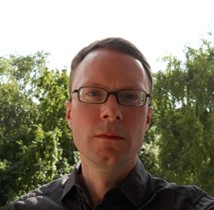Anthony Enns
Associate Professor

Email: anthony.enns@dal.ca
Phone: 902-494-1865
Mailing Address:
PO BOX 15000, Halifax, NS B3H 4R2
- Popular culture
- Cinema & media studies
- Cultural studies
- Critical theory
- History of science and technology
Education
- BA (North Carolina)
- MA, PhD (Iowa)
Anthony Enns is Associate Professor of Contemporary Culture—an interdisciplinary field that includes literary studies, media studies, and cultural studies. His current research particularly focuses on esoteric media practices and their cultural representations.
Selected Publications
· “Auditory Revelations: Spiritualism, Technology, and Sound,” in Connect and Divide: The Practice Turn in Media Studies, ed. Ulrike Bergermann, Monika Dommann, Erhard Schüttpelz, and Jeremy Stolow (Zürich: Diaphanes, forthcoming)
· “Satellites and Psychics: The Militarization of Outer and Inner Space,” in Militarizing Outer Space: Astroculture, Dystopia, and the Cold War, ed. Alexander C. T. Geppert, Daniel Brandau, and Tilmann Siebeneichner (New York: Palgrave Macmillan, forthcoming)
· “Psychic Spies: Cold War Science and the Military-Occult Complex,” in Mediality on Trial: Testing and Contesting Trance and other Media Techniques, ed. Daniel C. Barber and Ehler Voss (München: De Gruyter, forthcoming)
· “Live Musical Spectaculars: Eventizing Network Television in the Post-Network Age,” in Musicals at the Margins, ed. Martha Shearer and Julie Lobalzo Wright (London: Bloomsbury, forthcoming)
· “Visualizing Thoughts: Photography, Neurology, and Neuroimaging,” in Mind Reading as Cultural Practice, ed. Christian Kassung, Laurens Schlicht, and Carla Seemann (New York: Palgrave Macmillan, forthcoming)
· “Martian Channels: Imagining Interplanetary Communication at the Dawn of the Radio Age,” Radio Journal 17.2 (2019)
· “Information Theory of the Soul: Spiritualism, Technology, and Science Fiction,” in Believing in Bits: Digital Media and the Supernatural, ed. Simone Natale and D. W. Pasulka (New York: Oxford University Press, 2019)
· “Apocryphal Psychotechnologies,” continent 8.1-2 (2019)
· “Paratextuality and the Lost Urtext,” Notre Dame Review 48 (Summer/Fall 2019)
· “Sound Photography,” in Photography and Other Media in the Nineteenth Century: Towards an Integrated History, ed. Nicoletta Leonardi and Simone Natale (University Park: Penn State University Press, 2018)
· “Spiritualist Writing Machines: Telegraphy, Typtology, Typewriting” communication+1 4 (2015)
· “‘The Message is the Material’: Coded Bodies and Embodied Codes in Steve Tomasula’s VAS: An Opera in Flatland,” in Steve Tomasula: The Art and Science of New Media Fiction, ed. David Banash (London: Bloomsbury, 2015)
· “The Poet of the Pulps: Ray Bradbury and the Struggle for Prestige in Postwar SF,” Belphégor: Littérature populaire et culture médiatique 13.1 (2015)
· “Pseudoscience,” Oxford Handbook of Science Fiction, ed. Rob Latham (Oxford: Oxford University Press, 2014)
· “The Human Telephone: Physiology, Neurology, and Sound Technologies,” in Sounds of Modern History: Auditory Cultures in the 19th and 20th Century, ed. Daniel Morat (Oxford: Berghahn Books, 2014)
· “Vibratory Photography,” in Vibratory Modernism, ed. Anthony Enns and Shelley Trower (New York: Palgrave Macmillan, 2013)
· “The Undead Author: Spiritualism, Technology and Authorship,” in The Ashgate Research Companion to Victorian Spiritualism and the Occult, ed. Tatiana Kontou and Sarah Willburn (London: Ashgate, 2012)
· “Post-Reunification Cinema: Horror, Nostalgia, Redemption,” in A Companion to German Cinema, ed. Terri Ginsberg and Andrea Mensch (Oxford: Blackwell, 2012)
· “The Acoustic Space of Television,” Journal of Sonic Studies 3 (2012)
· “A Sum Over Histories: Faulkner’s Reconfiguration of Space-Time,” in Restoring the Mystery of the Rainbow: Literature’s Refraction of Science, ed. C. C. Barfoot and Valeria Tinkler-Villani (Amsterdam: Rodopi, 2011)
· “The Horror of Media: Technology and Spirituality in the Ringu Films,” in The Scary Screen: Media Anxiety in The Ring, ed. Kristen Lacefield (London: Ashgate, 2010)
· “The City as Archive in Jason Lutes’ Berlin,” in Comics and the City: Urban Space in Print, Picture, and Sequence, ed. Jörn Ahrens and Arno Meteling (New York: Continuum, 2010)
· “Psychic Radio: Sound Technologies, Ether Bodies, and Vibrations of the Soul,” The Senses and Society 3.2 (2008)
· “The Phonographic Body: Phreno-Mesmerism, Brain Mapping, and Embodied Recording,” in Sonic Mediations: Body, Sound, Technology, ed. Carolyn Birdsall and Anthony Enns (Newcastle: Cambridge Scholars Press, 2008)
· “The Politics of Ostalgie: Post-Socialist Nostalgia in Recent German Film,” Screen 48.4 (2007)
· “Mesmerism and the Electric Age: From Poe to Edison,” in Victorian Literary Mesmerism, ed. Martin Willis and Catherine Wynne (Amsterdam: Rodopi, 2006)
· “Media, Drugs, and Schizophrenia in the Works of Philip K. Dick,” Science Fiction Studies 33.1 (2006)
· “Voices of the Dead: Transmission/Translation/Transgression,” Culture, Theory and Critique 46.1 (2005)
· “Burroughs’s Writing Machines, in Retaking the Universe: William S. Burroughs in the Age of Globalization, ed. Davis Schneiderman and Philip Walsh (London: Pluto Press, 2004)
· “Mediality and Mourning in Stanislaw Lem’s Solaris and His Master’s Voice,” Science Fiction Studies 29.1 (2002)
· “Buffy the Vampire Disciplinarian: Institutional Excess and the New Economy of Power,” Popular Culture Review 13.2 (2002)
· “‘The Mutated Flowers of Hiroshima’: American Reception and Naturalization of Toho’s Godzilla,” Popular Culture Review 12.2 (2001)
· “Don’t Believe the Hype: Rereading Michael Joyce’s Afternoon and Twelve Blue,” Currents in Electronic Literacy 5 (2001)
· “The Fans from U.N.C.L.E.: Marketing the Swinging Sixties Spy Phenomenon,” Journal of Popular Film and Television 28.3 (2000)
· “The Spectacle of Disabled Masculinity in John Woo’s ‘Heroic Bloodshed’ Films,” Quarterly Review of Film and Video 17.2 (2000)
· “The Creation and Corruption of Diversity in MTV’s The Real World,” Studies in Popular Culture 22.1 (1999)
